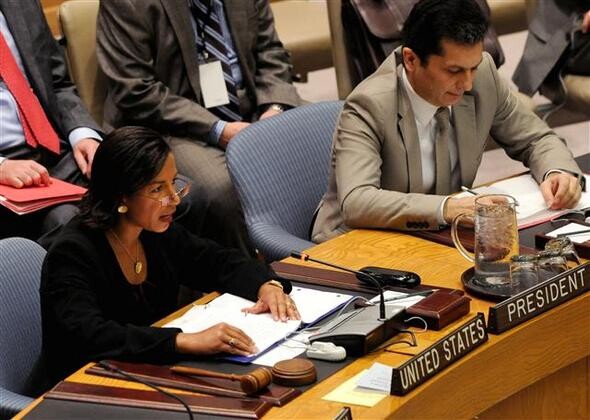hankyoreh
Links to other country sites 다른 나라 사이트 링크
China on board with UN condemnation of NK

By Park Min-hee and Kwon Tae-ho, Beijing and Washington correspondents
The presidential statement announced by the United Nations Security Council (UNSC) on Monday in response to North Korea’s rocket launch is considerably stronger than the statements that followed the North’s in 2009. China was unusually supportive of the measure and accepted the stance of South Korea and the US almost entirely.
The terms “condemn” and “contravention” from 2009 have both been upgraded this time, to “strongly condemn” and “serious violation.” In 2009, use of the term “serious violation” was dropped due to opposition from China.
The most notable part of the recent statement is the “trigger clause,” which states that if the North launches another rocket or nuclear missile, or conducts a nuclear test, suitable measures will “automatically” be adopted. China at first refused to accept this clause, but then accepted it in the course of discussions with the US. South Korea’s ambassador to the UN, Kim Sook, said, “This clause is the most powerful expression: it was not even included in the resolution on Syria of the 14th.”
The UNSC’s presidential statement was released four days after North Korea’s rocket launch. This is the shortest period ever for the UNSC. Such a swift conclusion was possible because China hardly raised any opposition. China at first demanded something milder than the 2009 statement, but then yielded to the US’s demands.
China’s change in approach is being interpreted as an indication of its dissatisfaction at the way North Korea went ahead with the launch despite China’s suggestions to exercise restraint. In an editorial on Tuesday, Chinese government newspaper Global Times emphasized, “China must not ‘soothe’ North Korea’s new administration. It must honestly state its attitude regarding North Korea‘s behavior.” The newspaper continued by warning, “If North Korea treats China with a ‘hijacker’ strategy that takes the view that China will protect it however it behaves, it will have to pay a price for this. Kim Jong-un must consider not only North Korea’s interests but also China’s difficulties when it comes to the nuclear issue.”
Together with its “warning” to North Korea, however, China also appears to be bearing the resumption of six-party talks in mind. “We hope that each country will make efforts to ensure that the February 29 [North Korea-US] agreement is implemented, and solve problems in an appropriate fashion through contact and dialogue,” said Chinese Foreign Ministry Spokesperson Lui Weimin after the presidential statement was issued. “China, together with other countries, will actively seek the resumption of six-party talks.”
“It appears that China, while sending a warning that it absolutely cannot tolerate North Korea going beyond a missile launch to a nuclear test, will work to revive an atmosphere for the resumption of six-party talks, even if this is difficult right now, after rapidly concluding procedures at the UNSC,” predicted a Beijing diplomatic source.
It appears, however, that it will be difficult to resume dialogue any time soon. China initially tried to include elements such as resumption of the six-party talks and the implementation of the North Korea-US agreement on denuclearization in the statement, but this came to nothing because of opposition from the US. The US has asserted that even the mentioning of dialogue, in the current circumstances, is inappropriate. North Korea’s response to the UNSC’s strong words will be the decisive factor in determining what comes next.
Please direct questions or comments to [english@hani.co.kr]
Editorial・opinion
![[Editorial] Yoon must halt procurement of SM-3 interceptor missiles [Editorial] Yoon must halt procurement of SM-3 interceptor missiles](https://flexible.img.hani.co.kr/flexible/normal/500/300/imgdb/child/2024/0501/17145495551605_1717145495195344.jpg) [Editorial] Yoon must halt procurement of SM-3 interceptor missiles
[Editorial] Yoon must halt procurement of SM-3 interceptor missiles![[Guest essay] Maybe Korea’s rapid population decline is an opportunity, not a crisis [Guest essay] Maybe Korea’s rapid population decline is an opportunity, not a crisis](https://flexible.img.hani.co.kr/flexible/normal/500/300/imgdb/original/2024/0430/9417144634983596.jpg) [Guest essay] Maybe Korea’s rapid population decline is an opportunity, not a crisis
[Guest essay] Maybe Korea’s rapid population decline is an opportunity, not a crisis- [Column] Can Yoon steer diplomacy with Russia, China back on track?
- [Column] Season 2 of special prosecutor probe may be coming to Korea soon
- [Column] Park Geun-hye déjà vu in Yoon Suk-yeol
- [Editorial] New weight of N. Korea’s nuclear threats makes dialogue all the more urgent
- [Guest essay] The real reason Korea’s new right wants to dub Rhee a founding father
- [Column] ‘Choson’: Is it time we start referring to N. Korea in its own terms?
- [Editorial] Japan’s rewriting of history with Korea has gone too far
- [Column] The president’s questionable capacity for dialogue
Most viewed articles
- 1Months and months of overdue wages are pushing migrant workers in Korea into debt
- 2Trump asks why US would defend Korea, hints at hiking Seoul’s defense cost burden
- 3[Editorial] Yoon must halt procurement of SM-3 interceptor missiles
- 4At heart of West’s handwringing over Chinese ‘overcapacity,’ a battle to lead key future industries
- 5[Guest essay] Maybe Korea’s rapid population decline is an opportunity, not a crisis
- 6Fruitless Yoon-Lee summit inflames partisan tensions in Korea
- 7First meeting between Yoon, Lee in 2 years ends without compromise or agreement
- 8Under conservative chief, Korea’s TRC brands teenage wartime massacre victims as traitors
- 9Dermatology, plastic surgery drove record medical tourism to Korea in 2023
- 10[Column] Park Geun-hye déjà vu in Yoon Suk-yeol